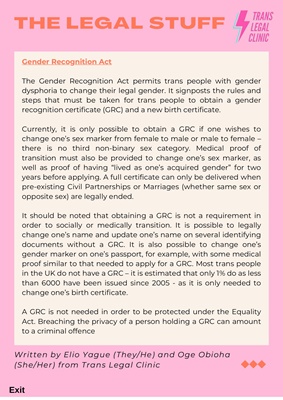
THE LEGAL STUFF
Gender Recognition Act
The Gender Recognition Act permits trans people with gender
dysphoria to change their legal gender. It signposts the rules and
steps that must be taken for trans people to obtain a gender
recognition certificate (GRC) and a new birth certificate.
Currently, it is only possible to obtain a GRC if one wishes to
change one's sex marker from female to male or male to female -
there is no third non-binary sex category. Medical proof of
transition must also be provided to change one's sex marker, as
well as proof of having "lived as one's acquired gender" for two
years before applying. A full certificate can only be delivered when
pre-existing Civil Partnerships or Marriages (whether same sex or
opposite sex) are legally ended.
It should be noted that obtaining a GRC is not a requirement in
order to socially or medically transition. It is possible to legally
change one's name and update one's name on several identifying
documents without a GRC. It is also possible to change one's
gender marker on one's passport, for example, with some medical
proof similar to that needed to apply for a GRC. Most trans people
in the UK do not have a GRC - it is estimated that only 1% do as less
than 6000 have been issued since 2005 - as it is only needed to
change one's birth certificate.
A GRC is not needed in order to be protected under the Equality
Act. Breaching the privacy of a person holding a GRC can amount
to a criminal offence
Written by Elio Yague (They/He) and Oge Obioha
(She/Her) from Trans Legal Clinic